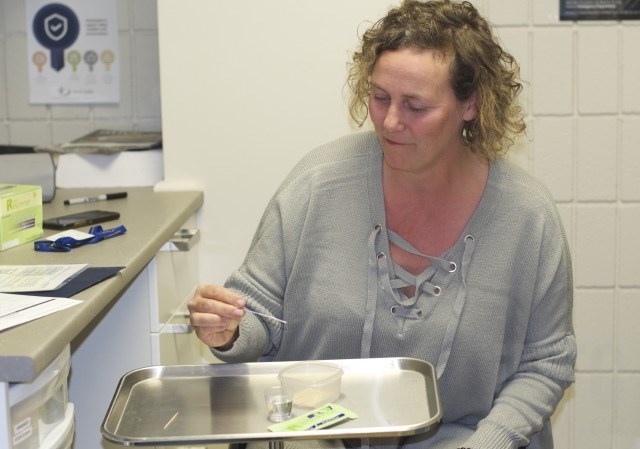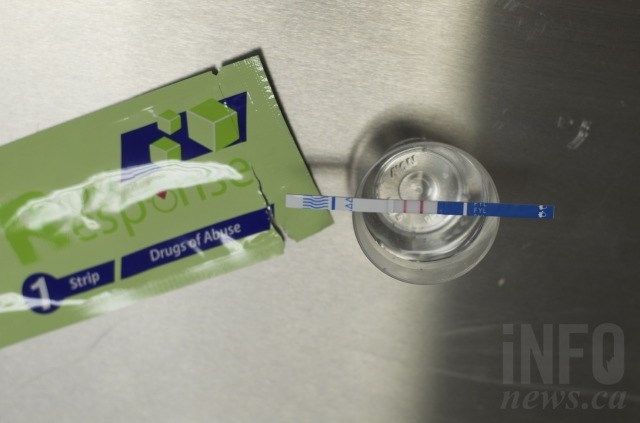
Outreach and education worker Alison Houweling demonstrates a drug checking service at the Downtown Vernon Primary Care Clinic.
(CHARLOTTE HELSTON - REPORTER / iNFOnews.ca)
November 09, 2018 - 6:30 PM
VERNON - With a toothpick, the outreach worker picks up a few sand-sized specks from a tiny envelope filled with a white substance. She then swishes the toothpick in a small plastic cup and dips a test strip in. A pair of red lines emerge on the strip, indicating there is no fentanyl in the substance.
It’s not all that surprising given that the “white material” is in fact table salt being used in a demonstration at the primary care clinic in downtown Vernon. Still, it’s a good example of how easy and fast it is to get your drugs checked for dangerous opioids like fentanyl.
The free and anonymous drug checking service — which takes mere minutes — has been available since August in Vernon as well as seven other communities in the Interior Health Authority including Kelowna and Kamloops in response to the opioid overdose crisis. Drug checking has become fairly standard at music festivals in recent years, but community-oriented initiatives like this one are quite new.
Right now, drug checking is available from 1 p.m. to 4 p.m. every Friday at the primary care clinic in Vernon, and outreach worker Alison Houweling says people have been using the service. She says the most common drug being brought in is heroin, although they can also test stimulants, psychedelics and other types of drugs.
“We have definitely found fentanyl,” Houweling says. “And some people are surprised to find there is fentanyl in their drugs.”

Outreach workers are trying to get the word out to users, particularly the "hidden population" who use in private residences to come and use the service.
(CHARLOTTE HELSTON - REPORTER / iNFOnews.ca)
She wants people to know that only a small amount of the drug is needed for testing — just enough to cover the tip of a toothpick — so users don’t need to give up a large portion of their supply.
Even though individuals can stay completely anonymous, Houweling says there is still a lot of shame and stigma related to drug use which is likely keeping some people from using the service.
The number of people who have used the service over its first few months appears to be modest — Interior Health didn’t provide statistics — but the hope among service providers is that usage will grow as more people become aware of its existence.
“We want to get the word out to the hidden population of users,” Houweling says, referring to those who use discreetly or alone, in their homes or private residences. “We would really love to engage with them and ascertain if they know if there is fentanyl in their drugs or not.”
The intention is primarily to provide education. With the slogan “know what’s in your dope!” the idea is simply to empower users by giving them more information about what they’re consuming. For example, finding fentanyl in a sample doesn’t necessarily mean the user will toss it in the garbage, but they may use it more cautiously or sparingly. The visit is also an opportunity for service providers to connect with people and provide other resources and information.

These two red lines mean no fentanyl was detected in the sample, however the test is not a 100 per cent guarantee. Because of how fentanyl is cut into other drugs, the sample might miss it entirely.
(CHARLOTTE HELSTON - REPORTER / iNFOnews.ca)
Jessica Bridgeman, a harm reduction coordinator with the Interior Health Authority, understands that despite the confidentiality afforded to clients, some may be afraid to use the service.
“We recognize it’s a vulnerable position to come into a clinic and sit down and actually pull a drug out of your pocket,” Bridgeman says. “It can be intimidating or awkward or fearful for people. We want to help change that.”
For one thing, she says users don’t need to be worried about law enforcement while visiting the clinic.
“They (users) are going to be safe if they come to any location doing drug checking (because) those services are operated under the ministerial order that allowed for overdose prevention services,” Bridgeman says. “All of the communities have engaged with the local RCMP detachments and made them aware.”
With the service only available one day a week in Vernon, providers are hoping that in the future, hours of operation can be expanded. There are other options out there for testing your drugs — you can even buy test strips at certain Dollar Stores — but Bridgeman says you should use them with caution.
“It’s important to understand that even if the test comes out negative, there could still be fentanyl in it,” she says.
She returns to the salt analogy, explaining that because of how dealers mix fentanyl in with other drugs, there could be a few grains of it here and there, and the test sample might miss it entirely.
Even the clinic’s test strips won’t guarantee if there is fentanyl or not, but at least staff can explain that to clients and provide other harm reduction information, Bridgeman says. The one place you can get a full picture of what's in your drugs is Kamloops, which has a more advanced drug-testing machine.
The service is an important piece of the overdose response, Bridgeman says, because no matter what Interior Health does in terms of providing treatment and supervised consumption options, none of that addresses the contaminated drug supply.
“This is at least one opportunity to know more about the contamination in your drugs and that piece could be a big part of the response,” she says.
Go here for a list of drug checking locations in the Interior.
To contact a reporter for this story, email Charlotte Helston or call 250-309-5230 or email the editor. You can also submit photos, videos or news tips to the newsroom and be entered to win a monthly prize draw.
We welcome your comments and opinions on our stories but play nice. We won't censor or delete comments unless they contain off-topic statements or links, unnecessary vulgarity, false facts, spam or obviously fake profiles. If you have any concerns about what you see in comments, email the editor in the link above.
News from © iNFOnews, 2018